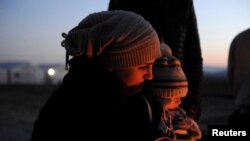Winter could bring death to asylum seekers stranded on crowded Greek islands with only summer tents for shelter, aid groups said on Wednesday, urging a mass relocation to the mainland.
More than 10,000 people, mostly Syrians and Iraqis fleeing years of war, have massed on the Greek islands that lie closest to Turkey, since the European Union agreed a deal with Ankara in March 2016 to shut down the route through Greece.
Authorities say the terms of the agreement prevent them from traveling to the Greek mainland until their asylum applications are processed. Those who do not qualify are deported.
But this has forced thousands to live in squalid conditions unfit for humans, the 20 aid groups said in a joint statement.
"We are in a race against time. Lives will be lost 'again' this winter unless people are allowed to move, in an organized and voluntary fashion, to the mainland," said Jana Frey, who leads Greek operations for the International Rescue Committee.
Exposure to bad weather is a key risk, along with overcrowding, lack of basic services and a reliance on dangerous and impromptu measures to keep warm, the groups said.
Last year, a 66-year old woman and 6-year-old child died in Lesbos after a cooking gas canister exploded in a tent.
"Nothing can justify trapping people in these terrible conditions on the islands for another winter," said Eva Cosse, Greece researcher at Human Rights Watch.
The government has moved 2,000 people to camps on the mainland after the groups wrote an open letter to Prime Minister Alexis Tsipras last month, but conditions for those remaining on the island have since deteriorated, they said.
Crowded camps on Lesbos, Samos, and Chios are holding two to three times more people than they should, including single women and children, the aid workers said. Some women are also sharing tents with unrelated men, further jeopardizing their safety.
"European countries and Greece should urgently work together and move asylum seekers off the islands," said Gabriel Sakellaridis, director of Amnesty International in Greece.
On Monday, residents on Lesbos went on strike, shutting businesses, shops, municipal offices and nurseries to protest against policies that they say have turned their island into a "prison" for migrants and refugees.
About 30,000 people have arrived in Greece this year, a fraction compared to the nearly 1 million who arrived in 2015. Greek authorities in London and Athens did not immediately respond to a request for comment.
Reporting by Umberto Bacchi, Editing by Lyndsay Griffiths.





